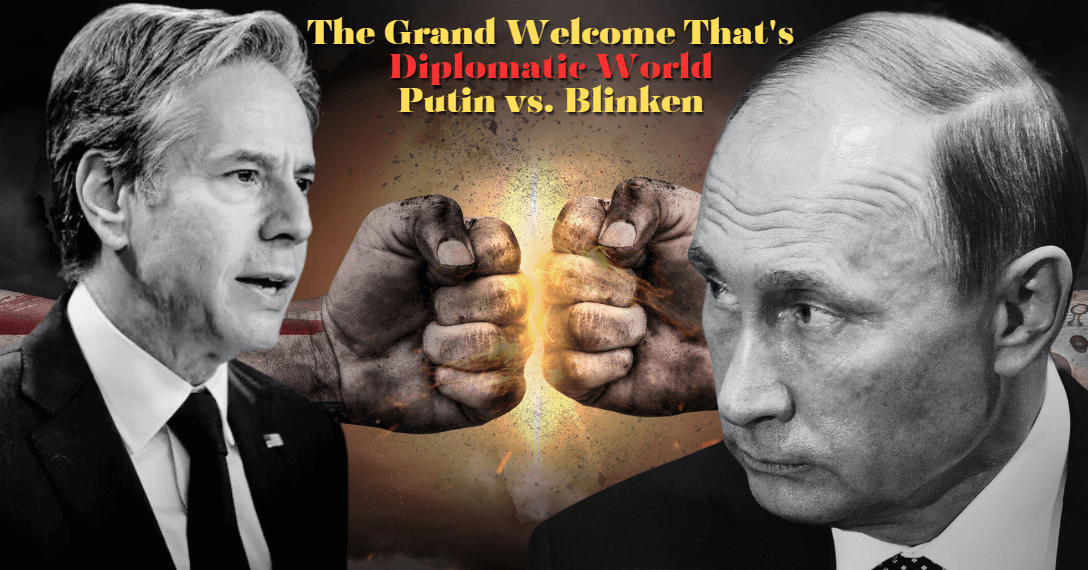From Red Carpets to Red Faces: Putin’s VIP Arrival vs. Blinken’s Snub
In June, the world witnessed two starkly contrasting receptions in Beijing. First, U.S. Secretary of State Antony Blinken arrived, and shortly after, Russian President Vladimir Putin’s arrival at the Beijing Capital International Airport created waves of distinction in the level of hospitality extended to these two foreign dignitaries. This article delves into the grandeur of Putin’s welcome in Beijing and compares it with Blinken’s relatively low-key reception, highlighting the geopolitical implications and the symbolism behind these events.
Putin’s Arrival: A Grand Reception
Vladimir Putin, the President of Russia, landed in Beijing to a remarkable red-carpet welcome. He was greeted by none other than Chinese Commerce Minister Wang Wentao, alongside a delegation of high-ranking officials. The welcoming party was not limited to formalities, as a guard of honor added to the grandeur of the moment. This level of extravagance and protocol signified the significance of Putin’s visit and the deepening ties between Russia and China.
Blinken’s Low-Key Visit
In stark contrast, when Antony Blinken, the U.S. Secretary of State, visited China in June, he received a reception that was significantly understated. The subdued nature of his arrival raised eyebrows and left many speculating about the reasons behind such a marked difference in treatment. This disparity was more pronounced given the fact that Blinken’s visit was the first by a top U.S. diplomat in five years. The subdued welcome was an evident reflection of the strained U.S.-China relations.
Blinken’s visit to China had been initially scheduled for February but was postponed due to a diplomatic spat caused by what the U.S. alleged to be a Chinese spy balloon incursion into American airspace. Remarkably, the only people who welcomed Blinken were Yang Tao, the director of the Chinese Ministry of Foreign Affairs’ North America and Oceania Department, and the American ambassador. Yang Tao’s position was perceived as a “much lower level” compared to the counterparts who greeted Putin. The absence of the traditional red carpet and welcoming crowds sent a clear message, one that was both symbolic and deliberate, as it was perceived to be a humiliation by some observers.
Public Reactions and Social Media
The contrasting welcomes of Blinken and Putin drew significant attention on social media platforms and among political analysts. Human rights activist Jennifer Zeng voiced her thoughts on social media, emphasizing the deviation from Chinese cultural and diplomatic norms. She pointed out the absence of a red carpet and the customary waist drum performance during Blinken’s arrival. This was indeed unusual by Chinese standards, and Jennifer Zeng’s remarks underlined the deliberate nature of the disparity.
Blinken vs. Macron: A Comparative Analysis
To further emphasize the contrast, it’s worth noting the difference in treatment received by Antony Blinken during his visit and that accorded to French President Emmanuel Macron during his state visit in April. Macron’s arrival in Beijing was marked by a lavish red carpet welcome and an airport greeting from China’s top diplomat, Wang Yi. This sharp contrast highlighted not only the disparities in the reception of different foreign dignitaries but also the strategic and diplomatic significance of these receptions.
Putin’s Agenda and Geopolitical Implications
Ahead of his visit, Vladimir Putin granted an interview to Chinese state television, where he emphasized the strong and growing ties between Moscow and Beijing. One of the main goals mentioned was the aspiration to increase annual trade between the two countries to an impressive $200 billion by the following year. Putin also praised his Chinese counterpart, Xi Jinping, as a “friend,” underscoring the significance of China as a diplomatic and economic ally. Putin’s reliance on China has grown as the conflict in Ukraine persists, and Russia faces mounting international sanctions.
International Warrant and Putin’s Visit
Of particular note is the timing of Putin’s visit. It marked his first trip outside the countries of the former Soviet Union since the International Criminal Court (ICC) issued a warrant for his arrest in March. Importantly, China is not a member of the ICC, adding an intriguing layer of geopolitical complexity to the visit. This development reflects Russia’s strategic pivot towards China in the face of international legal challenges.
The Future of Sino-Russian Relations
In conclusion, the contrasting receptions of Antony Blinken and Vladimir Putin in Beijing serve as a reflection of the evolving geopolitical landscape. Putin’s grand welcome symbolizes the strengthening ties between Russia and China, while Blinken’s subdued reception signifies the current tensions in U.S.-China relations. These events also underscore the strategic shift in Russia’s foreign policy, with China playing a pivotal role as Russia’s ally and economic partner. As the world watches these developments, the future of Sino-Russian relations is poised to shape global politics and economics significantly.



